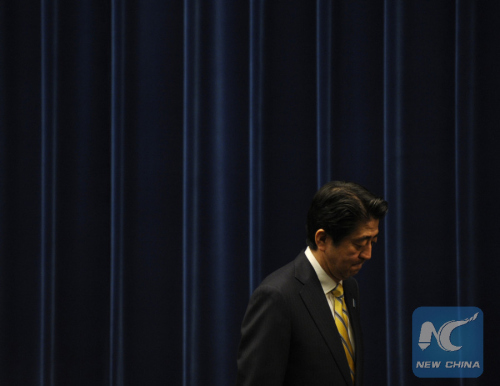
Japanese Prime Minister Shinzo Abe leaves after a press conference at his official residence in Tokyo, Japan, Nov. 21, 2014. (Photo: Xinhua/Stringer)
Statistics released Wednesday showed Japan recorded better-than-expected economic growth numbers in the first quarter of the year. However, economists said the real picture may not be as rosy as it looks to be based on preliminary statistics.
The reform plans championed by Prime Minister Shinzo Abe, known as Abenomics, are not likely to lift Japan out of sluggish growth, they said, citing the persistent deflationary risks and weak investment growth.
Shane Oliver, chief economist at AMP Capital, said Abenomics, featuring aggressive monetary easing including the unprecedented and controversial negative interest rates, had started off with much fanfare and pushed inflation into positive territory despite weak oil prices.
However, "confidence in it, I think, has failed dramatically over the last year or so," Oliver said.
Data released by the Cabinet Office showed that Japan's real economic growth was 0.4 percent quarter on quarter in the first three months of the year, translating into an annualized growth of 1.7 percent.
That enabled Japan to barely escape a technical recession, defined as two consecutive quarters of quarter-on-quarter contraction.
In particular, domestic personal consumption, accounting for around 60 percent of the gross domestic product (GDP), climbed 0.5 percent quarter on quarter in real terms, an apparent improvement from the previous quarter's decline of 0.8 percent.
Indeed, things are not as good as they appear. In nominal terms, domestic personal consumption in the first quarter fell by 0.1 percent from the previous quarter, indicating ongoing weak consumer confidence. This is also confirmed by a quarter-on-quarter decline of 0.9 percent in the consumer confidence index in the month of April.0 The latest statistics showed that enterprises were not willing to increase their investment, which the government had hoped would function as the leading driver of an envisaged economic recovery.
In the first quarter of this year, investment by Japanese enterprises dropped 1.4 percent from the previous quarter.
Economists said the initial signs of success of Abenomics may have been partly due to a weak yen as the U.S. dollar had been rising at that time. However, Japanese exporters have faced strong headwinds recently as the U.S. dollar had been largely weak.
Abenomics failed to lift Japan out of deflationary risks, too. The central bank had repeatedly postponed the date for fulfilling the target of pushing the inflation rate up to 2 percent.
Dario Perkins, an economist with Lombard Street Research, said Abenomics has been used to galvanize corporate investment at the cost of domestic consumers as the yen weakened against foreign currencies.
The Japanese government's gamble of aggressive monetary easing has not been successful so far, Perkins said.
Even large enterprises were unwilling to increase their investments, partly due to their lack of confidence in Japan's economic growth as the yen is not expected to be persistently weak against the dollar.
Statistics showed that they are sitting on cash. The cash held by large Japanese enterprises in 2015 rose by 32.4 percent from ten years ago, whereas their fixed asset investments increased by only 16.3 percent.
Setsuo Otsuka, an economist with the Brookings Institution, said in a recent article that consumer confidence was affected by the weak yen.
Abenomics consists of three pillars: monetary easing, fiscal stimulus and structural reforms. But economists said Japan has relied too much on monetary easing and less on fiscal measures and structural reforms. The extremely aggressive monetary easing has prompted other economies to voice their concerns over the potential spillover from such moves.
Japan should abandon the policy of relying solely on monetary easing and instead focus on structural reforms including measures to reinvigorate the labor market, Otsuka said.


















































